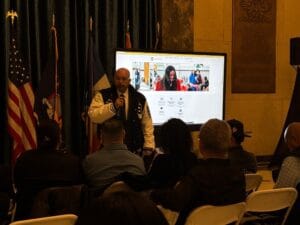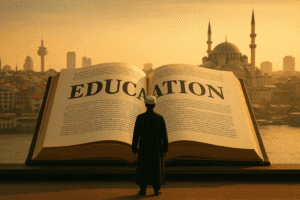EDUPEACE | The language of peace

As humans, language is the essence and quintessence of our existence. There is hardly anything we can do or achieve without the instrumentality of language, the most remarkable characteristic that sets our species apart from other creatures. Not only is our world built by language in theory and practice, we live every day “languaging”. In other words, beyond being “homo sapiens” or human beings, we are essentially “homo loquens” (talking beings).
The language we use significantly affects the life we live and the world we create around us. This is because language is our instrument of thought, with our words translating our innermost feelings into actual reality. Language forms, informs, reforms and transforms us. When negatively used, it also ‘deforms’ us. Frank Outlaw was reputed to have said, “Watch your thoughts, they become words; watch your words, they become actions; watch your actions, they become habits; watch your habits, they become character; watch your character, for it becomes your destiny.” The destiny of our common humanity all depends on our words.

In the beginning was the word, and the world came into being by the word. It is through words that we construct and destroy, make and mar, cooperate with some people and alienate others, create relationships and damage friendships, build bridges and erect walls. It is through language that we make peace, express aggression, fuel conflict and declare war. It appears without doubt that for us to live peacefully, positively, happily and harmoniously, we must cultivate the language of peace.
Peace suggests the absence of war, anxiety, suffering or violence in a just and orderly society. Though most people say they desire peace, the highest, greatest and noblest good, the reality is that their language often betrays it. As peace is the purpose of life though the reality of our world today is conflict, it is necessary to cultivate the language of expressing peace in order to recreate it.
As Prof. Gomes de Matos (2012) once counseled, language users are supposed to engage in LIF-PLUS: life-improving force of peaceful language use, an approach to language use, and embrace the twin concepts of communicative peace and communicative dignity. These terms are anchored on his conviction that 1) “life can be improved communicatively when language use is thought of – and implemented – as a peacebuilding force” and 2) “life can be communicatively improved when language users are educated to learn to use language peacefully for the good of persons, groups and entire humankind.”
In modeling language of peace in everyday life, it is important for users to be guided by certain principles that in my view undergird peaceful language use. These principles are simply to speak positive, leave negativity, listen more, learn fresh, live right, love others, lessen hurt, and let go.
Speaking positive entails deliberately choosing positive words, which are called ‘positivisers’. Positive words make the hearer feel good while negative ones make the hearer feel bad or sad. If language users make efforts to appreciate others, be polite to them, apologize to them, affirm their positions and restrain form verbally abusing or attacking them, there’ll be positivity in the society.
Meanwhile, at the other side of the coin, it is also crucial to leave negativity in speech and action. To verbally abuse others, insult them, backbite them, slander them, disparage them or assassinate their character is negative energy. It is required that you filter negativity from your tongue before you pronounce your words. It is normal for people to step on your toes but you are capable of refraining from dressing them down, disgracing them or undermining their self-worth. It is noble to leave negative words out of one’s lexicon.
Besides, listening more is a sure way of getting what others are saying. One many occasions, communicators are fixated on reacting rather than responding. Interruptions that often prolong discourse or distract attention from what is being said often take place. While it is easy for many people to talk as talk is cheap, it is difficult for them to listen. Learning to listen is a prerogative of cultivating the language of peace. By listening, you learn more and more understanding removes prejudice and bias, hatred and enmity. In fact, learning more about others, including their languages and cultures, is one of the ways of seeing them in their true colors, not their distorted visage.
The world we live reflects the language we use and it is important to live right as responsible citizens and decent individuals. What language would come from terrorists, bandits, kidnappers, armed robbers, fraudsters, prostitutes, thugs and vagabonds? As George Orwell once noted, “When the general atmosphere is bad, language must suffer.” The language of peace grows in an environment devoid of weeds, corruption and social vices.
Furthermore, loving others, especially one’s communicative neighbor, is a requirement of using peaceful language. Even if it is said that truth hurts, one can lessen hurt by being polite, graceful and kind in expressing opinions. Rather than calling someone a liar, a user of language may say he does not agree with him. There are always alternative ways of saying whatever we want to say in order not to severely hurt the other person. The diplomatic language, for instance, is a way of telling people to go to hell with them looking forward to embarking on the trip!
Lastly, the language of peace is marked by the psychology of letting go. It is always better to lose an argument than to lose a friend. It is not everything that is worth reacting to. It is said that it is better to remain silent and be considered a fool than to speak up and remove all the doubt. When you hear something unpleasant, do not react because reactions are mostly negative. Let go and if you can’t completely ignore it, respond with calm, don’t react with negative energy.
GOOD NATURE, BAD NATURE
Life is made up of opposite forces, the good and the bad, the positive and the negative, the bright and the dull. Yet, it is the good forces that should serve as your standard of judgment, not the bad ones. There is no justification for crime even if criminals live in luxury and the righteous live in penury. The good must trump the bad and under no circumstance should any conscious mind be swayed by the prevalence of evil.
People may be cheating and stealing, be different. They may be participating in all kinds of immoral challenges and engaging in shameful behavior to trend or follow the crowd. At least, if you cannot make them embrace what is good, their vices shouldn’t attract you. Even if it is hurts, it is better you always do what is right.
There was a man who noticed a drowning scorpion in a river while trying to wash his face. Out of pity, he attempted to scoop it out with his hands but the scorpion stung him. Undeterred, he reached for the scorpion again with his cupped hands and he was again stung. His friend, who was nearby, was transfixed in disbelief. Then, the man grabbed the scorpion and quickly launched it out of imminent death onto the riverbank as he felt searing pains in his fingers.
The man’s friend got closer and queried him, “Friend, why did you insist on saving the scorpion when you know its nature is to sting?” The man responded, “It is because to save life is my nature and to sting is his. I wouldn’t allow his own nature to influence mine.”
Rather than succumb to the ubiquitous forces of evil that make kindness, goodness and virtue appear unfashionable, it is crucial that you don’t allow others’ bad behavior to sway you from doing what is right or good. Afterall, everyone will ultimately be responsible for their actions.
To live an amazing life, have maximum respect for what is past; have infinite service to all that is present and have utmost responsibility to the future.
Prof. Mahfouz A. Adedimeji
University of Ilorin, Ilorin, Nigeria














